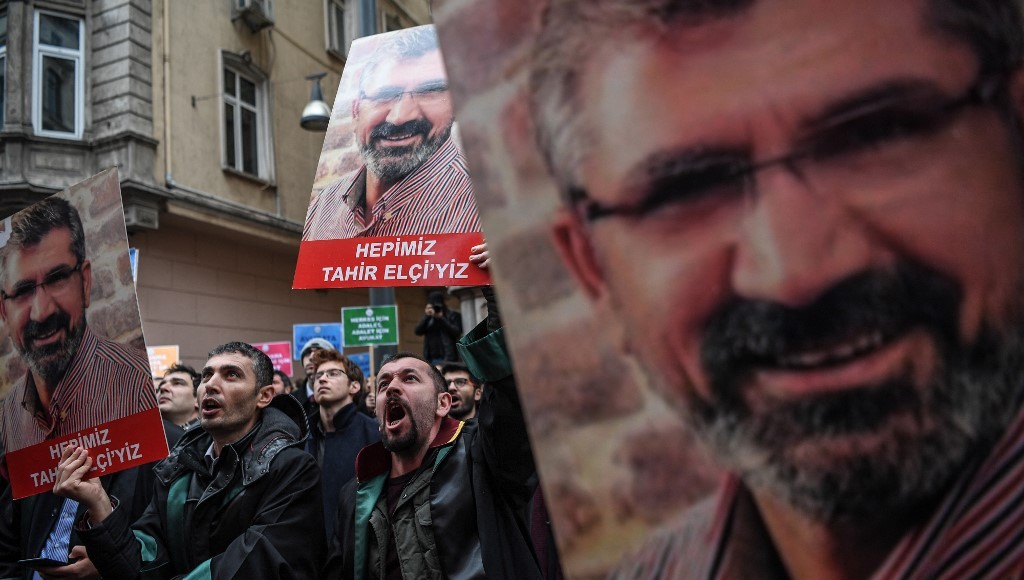Bünyamin Tekin
A Turkish court has acquitted three police officers accused of killing prominent human rights lawyer Tahir Elçi, who was shot dead in 2015 in Diyarbakır’s Sur district, sparking protests from lawyers and human rights activists who argue that justice has not been served.
Elçi, the former head of the Diyarbakır Bar Association, was shot in the head during a press conference on November 28, 2015 while calling for peace in front of the historic Four-Legged Minaret. A clash between Turkish police and members of the outlawed Kurdistan Workers’ Party (PKK) erupted at the scene, and Elçi was caught in the crossfire.
The Diyarbakır court acquitted police officers Sinan Tabur, Fuat Tan and Mesut Sevgi, who were on trial for “causing death by gross negligence.” The officers attended the trial via video link and pleaded not guilty. The court’s decision followed a 30-minute recess during which tensions in the courtroom rose.
Before the verdict was announced, Diyarbakır Bar Association President Nahit Eren and Tahir Elçi Foundation President Masum Batı left the courtroom in protest, stating they did not expect a fair decision. They were joined by other lawyers who then marched to the scene of Elçi’s death, the Four-Legged Minaret, to continue their protest.
In the lead-up to the trial, the prosecutor’s office had presented an opinion on April 25, stating that “Elçi was killed by a bullet whose origin could not be definitively determined.” They recommended the acquittal of the three police officers and the conviction of fugitive PKK member Uğur Yakışır for “killing two police officers” and “undermining the unity of the state.”
Lawyers for the Elçi family criticized the handling of the case, stating that their requests to uncover the truth were dismissed. They alleged that evidence was mishandled and destroyed. Türkan Elçi, the widow of Tahir Elçi, noted that the bullet that killed her husband was never found and that “key pieces of evidence, including 40 bullet casings, were lost or destroyed.”
Erinç Sağkan, president of the Union of Turkish Bar Associations, condemned the trial for violating legal principles. “You claim to uphold universal legal principles, but where do we place the principle of direct confrontation?” Sağkan asked. “We were denied the right to cross-examine the suspects, and many fundamental rights of a fair trial were violated.”
Berfin Elçi, another lawyer for the Elçi family, echoed these sentiments, stating that the conduct of the trial amounted to a denial of justice. “The trial failed to bring the perpetrators to justice and violated the right to a fair trial,” she said.
The trial has garnered significant attention overseas, with 33 international legal organizations, including bar associations from Germany, France, Belgium and the Netherlands, issuing a joint statement. They called for a thorough investigation and a fair trial, noting several procedural flaws, such as a 110-day delay in the crime scene investigation and the initial failure to treat the police officers as suspects.
A forensic report by the London-based Forensic Architecture played a crucial role in the case, concluding that Elçi was likely killed by a bullet fired from one of the police officers’ guns. However, this evidence was reportedly not given due consideration during the trial.
Ali Yıldız, director of the Arrested Lawyers Initiative, criticized the investigation’s design, saying, “With the entire investigation designed to ensure impunity, it is not surprising at all that no one is held accountable for the killing of the president of a prominent bar. The destruction of key evidence in the Council of Forensic Medicine, as reported by journalist Cevheri Güven back in 2019, was to ensure today’s outcome.”
The court’s decision to acquit the police officers has deepened concerns about impunity and the rule of law in Turkey, especially in cases involving state officials and Kurdish activists. The next steps for the Elçi family and their legal team remain uncertain, but they have vowed to continue their fight for justice.

